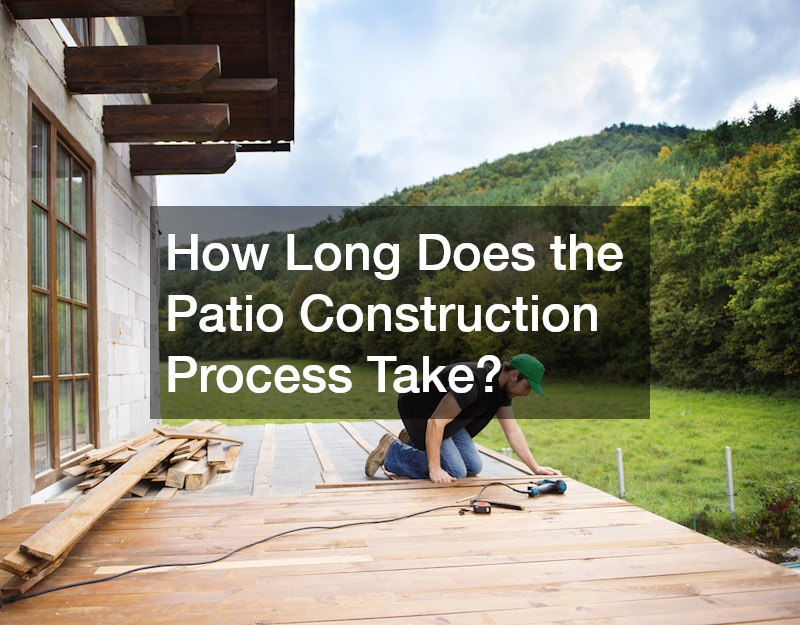There’s something deeply satisfying about stepping into your backyard and feeling like you’ve entered your own private oasis. Whether you imagine a space for entertaining guests, lounging in solitude, or hosting family cookouts, your outdoor area has incredible potential. But turning that vision into reality takes more than a quick trip to the hardware store and a free weekend. This is where partnering with a patio contractor becomes essential.
A seasoned patio contractor brings a blend of creativity, technical knowledge, and construction expertise to your project. From planning and design to material selection and installation, they ensure that your outdoor retreat isn’t just attractive, but functional, durable, and tailored to your lifestyle. These professionals understand the intricacies of patio construction, local codes, and even how to integrate features like a glass door system or coordinate with a tree contractor during site prep.
A well-planned outdoor living space adds value to your home and enhances your quality of life. Whether you’re incorporating smart technology, working with deck builders to expand your space, or setting up a residential garden irrigation system, the right partner makes all the difference. Let’s explore what it takes to create your perfect retreat—and why a patio contractor should be your first call.
Why Should You Hire a Patio Contractor?

Expertise and Experience
A patio contractor does more than just pour concrete or lay pavers. They bring years of hands-on experience to the table, ensuring your patio is built to last. They understand how to grade a yard properly, handle water drainage, and work around existing landscaping features like trees or irrigation systems. They can even coordinate with a local tree company to assess roots that might interfere with your project.
Access to Quality Materials
Working with a patio contractor gives you access to high-quality materials that aren’t always available to the average homeowner. Whether you want natural stone, composite decking, or stained concrete, they’ll help you choose materials that balance beauty, durability, and maintenance needs. This also streamlines collaboration if you’re bringing in deck builders to enhance the space.
Efficient Project Management
Hiring a patio contractor means your project stays on schedule and within budget. They handle permits, deliveries, and subcontractors, so you don’t have to. If your patio connects to a glass door system or requires structural coordination with your home, they’ll make sure everything lines up—literally and legally.
What to Consider When Designing Your Outdoor Retreat?
Purpose and Functionality
Before breaking ground, consider how you’ll use the space. Is it for grilling, lounging, or playing with the kids? Do you want a fire pit, an outdoor kitchen, or maybe a quiet reading nook? Your patio contractor can help map out zones and flow, possibly working with a local sliding door repair expert to ensure smooth transitions from indoors to out.
Budget and Cost Analysis
Your budget should account for more than just materials. Labor, permits, irrigation adjustments, and even potential tree service costs can influence the final price tag. An experienced contractor will walk you through all foreseeable expenses so you can prioritize features without surprises.
Aesthetic Preferences
Your outdoor space should reflect your personality and complement your home’s architecture. From rustic stone patios to modern composite decking, a patio contractor will help you curate a design that feels cohesive and inviting. They may also bring in deck builders to seamlessly extend your outdoor square footage.
How to Choose the Right Patio Contractor?
Checking Credentials and Experience
Don’t hire just anyone with a truck and some tools. Look for a patio contractor who is licensed, insured, and has proven experience in similar projects. A reputable contractor will have no problem sharing their credentials, past work, and references. It’s also worth verifying how long they’ve been in business and whether they stay up to date with industry best practices and local building codes. Contractors with certifications or memberships in professional associations demonstrate a commitment to quality and professionalism. Experienced patio contractors often have established relationships with other specialists, such as deck builders or local sliding door repair services, which can be a huge advantage for complex projects.
Evaluating Past Projects
Ask to see a portfolio of previous work. This gives you insight into their design style, attention to detail, and the range of materials they’ve worked with. If you’re incorporating features like a glass door system or working near existing landscaping, ask about those specifics too.
Client Reviews and Testimonials
Online reviews are invaluable, but dig deeper by asking the contractor for direct client contacts if you want detailed feedback. Look for patterns in reviews about timelines, professionalism, communication, and final results. Did the contractor collaborate well with other specialists, like a tree contractor or irrigation company? These insights help you avoid headaches down the line and choose a partner who values transparency and customer satisfaction. Testimonials can also reveal how contractors handle problems or changes, which is critical since outdoor projects often involve unforeseen challenges. A strong reputation in your local community is a positive sign of reliability.
What Are the Latest Trends in Patio Design?

Sustainable Materials
Eco-friendly materials are having a moment. Recycled pavers, sustainably harvested wood, and low-impact concrete mixes are popular among homeowners looking to minimize their environmental footprint. A knowledgeable patio contractor can help source and install these materials responsibly.
Smart Technology Integration
Imagine controlling your patio lighting, irrigation system, and outdoor speakers with your phone. Smart tech is now a common feature in modern patios. Your contractor might coordinate with an irrigation company or other specialists to wire everything seamlessly.
Multi-functional Spaces
Today’s outdoor spaces are all about flexibility. Built-in seating, retractable canopies, and convertible dining areas are just a few ideas. You might even consult with deck builders to create multi-tiered zones or connect your patio to other parts of the yard.
How to Prepare Your Space for Patio Construction?
Site Assessment and Clearance
Before construction starts, your patio contractor will assess the site. This includes checking for slopes, roots, and existing utilities. If tree roots are an issue, they may coordinate with a local tree company to remove or trim them safely.
Obtaining Necessary Permits
Permits ensure your patio complies with local zoning laws and building codes. Your contractor will handle the paperwork, saving you from bureaucratic headaches and ensuring your investment is protected.
Coordinating with Neighbors
If you live in close quarters, a quick conversation with your neighbors goes a long way. Noise, debris, or shared fences might come into play. Your patio contractor can also help manage expectations and minimize disruptions.
What Materials Are Best for Your Patio?
Stone and Pavers
Natural stone and concrete pavers offer timeless beauty and incredible durability. They’re ideal for high-traffic areas and can be arranged in intricate patterns to match your aesthetic. Maintenance is relatively simple, especially with proper sealing.
Wood and Composites
If you’re looking for a warm, natural look, wood or composite decking might be the answer. Many homeowners work with both patio contractors and deck builders to blend these materials in tiered outdoor spaces.
Concrete and Alternative Surfaces
Stamped concrete, exposed aggregate, and even rubber pavers offer creative possibilities. A skilled patio contractor will walk you through pros and cons, considering weather exposure and foot traffic.
How Long Does the Patio Construction Process Take?

Factors Influencing Timeline
The timeline can vary based on weather, materials, permits, and the complexity of the design. If you’re also installing a glass door system or coordinating with a tree contractor, expect additional time for those elements.
Typical Project Phases
After planning, your contractor will prep the site, pour foundations, install surfaces, and handle finishing touches like lighting or planter boxes. If your design includes a residential garden irrigation system, that may be installed before hardscaping begins.
Dealing With Delays
Delays happen. Rain, permit hold-ups, or material backorders can throw off your schedule. A reliable patio contractor will keep you informed and work efficiently to stay on track.
What Costs Are Involved in Hiring a Patio Contractor?
Assessment of Estimates
A detailed estimate should include labor, materials, permits, and equipment rental. If your patio involves work with an irrigation company or local sliding door repair, those costs may be listed separately.
Hidden Costs and Additional Charges
Excavation surprises, tree root issues, or the need for lawn tractors to move large materials can add unexpected costs. That’s why transparent communication with your patio contractor is so important.
Payment Terms and Schedules
Most contractors request a deposit upfront, with milestone payments throughout the project. Avoid those who demand full payment before work begins. Set clear expectations about final inspection and cleanup as well.
How to Maintain Your Patio Post-Construction?
Regular Cleaning Routines
Sweep regularly, hose down surfaces, and remove debris from between pavers. If you have a wood deck element, wash and seal it annually. Your patio contractor may offer a maintenance guide tailored to your materials.
Seasonal Maintenance Tips
In colder climates, be cautious with snow shovels and salt. In spring, check for drainage issues or cracks. Coordinate with your irrigation company for spring start-up and fall shutdown to protect underground systems.
Long-term Care Strategies
Schedule inspections every few years, especially if your patio is near trees. A local tree company can help keep roots in check. Likewise, consider occasional sealing or resealing to extend surface longevity.
What to Do If You Encounter Issues With Your Patio?

Common Problems and Fixes
Even the best-designed patios can develop issues over time. Cracked pavers, drainage problems, or loose stones are some of the more common challenges homeowners face—especially after seasonal changes or heavy use. Minor issues can often be resolved with simple repairs or resealing, but more complex problems may require help from your original patio contractor. Prompt attention can prevent small issues from escalating into costly damage. For example, poor water runoff could be caused by an underlying flaw in your residential garden irrigation system or grading misalignment. Left unchecked, this could lead to erosion, foundation problems, or water pooling that damages nearby structures or plantings. Catching these signs early means you can keep your outdoor retreat safe, usable, and looking its best.
Warranty and Contractor Support
Most reputable patio contractors offer some form of warranty coverage for their work, which usually lasts from one to five years. Always ask about specific terms and get them in writing before signing any contract. It’s also smart to clarify what counts as standard coverage versus wear and tear. Some contractors go above and beyond, providing extended support options, such as seasonal maintenance or inspections that check the integrity of joints, surfaces, and any adjoining structures like a glass door system. Others may coordinate with a local tree company or irrigation company to ensure nearby landscaping doesn’t interfere with the patio’s structure. Keeping a line of communication open with your patio contractor can make post-project support easy to access and much more efficient when you need it.
When to Consider Professional Repairs
Not every patio issue can be handled with a DIY fix or a quick touch-up. If you’re seeing signs like uneven settling, expanding cracks, or water intrusion into indoor spaces, it may be time to bring in additional professionals. For instance, root upheaval caused by overgrown trees might require help from a tree contractor or local tree company to stabilize the surrounding area. If your patio opens to your home through large doors, problems with alignment, sealing, or locking might call for local sliding door repair to prevent heat loss and water damage. Similarly, irrigation leaks or broken sprinkler heads could affect your patio’s substructure—requiring both your patio contractor and a licensed irrigation company to collaborate. In some cases, fixing patio grading might even require the use of heavy equipment like lawn tractors to re-level and reinforce the ground underneath. Knowing when to call in experts ensures long-term protection of your investment and keeps your outdoor space functional and inviting.
Conclusion
Transforming your backyard into a beautiful, functional retreat starts with the right team—and a skilled patio contractor is the cornerstone of that team. From the first consultation to the final sealant, they guide your project with an expert eye and a steady hand. They know how to work around natural features, integrate smart technology, and ensure your patio flows perfectly with the rest of your home.
Whether you’re envisioning a sleek lounge space with a glass door system or a rustic retreat surrounded by greenery, a trusted patio contractor will bring that vision to life. They also know how to partner with other specialists—like deck builders, tree service pros, and your go-to irrigation company—to ensure every detail aligns.
A great outdoor space isn’t just about aesthetics—it’s about durability, usability, and creating a place you love. With the right guidance, you can enjoy a backyard that feels like an extension of your home year-round.
When you’re ready to start building your sanctuary, don’t go it alone. Partner with a patio contractor who understands your vision, respects your budget, and has the know-how to make it happen.


